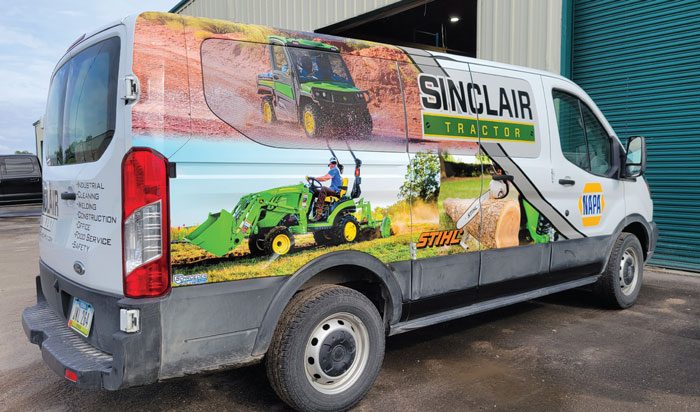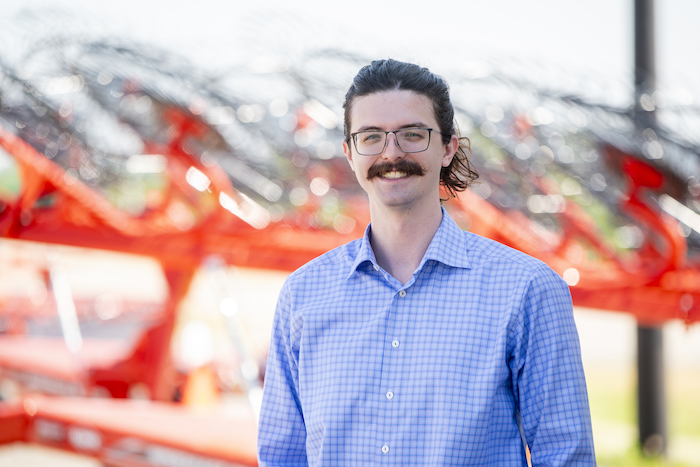Bob Sinclair is no stranger to alternative revenue streams. As CEO of 13-store Iowa John Deere dealer Sinclair Tractor, he oversaw the dealership’s purchase of a NAPA store in its early days, a business they are still in today. And recently, they moved into another new market: the supply business.
About 2 years ago, the dealership opened Sinclair Supply, which supplies local businesses and farmers with janitorial, office, industrial and food service products. They deliver a variety of products including pens, cleaning products, napkins, hand trucks and butcher paper.
The business was formed through a merger with a local supplier — Midwest Professional Solutions — after its owner Max Bender began working as a consultant for Sinclair Tractor’s NAPA business. Bender stayed on to head up the company’s NAPA and supply division.
Delivering Farmers’ Supplies
Beginning over 2 decades ago with the decision to open the NAPA store Sinclair has learned at least one thing: how to spot a synergistic business opportunity.
“You’re always looking for something to do to attract customers to come do business with you,” Sinclair says. “We started off just selling farm equipment. Then a NAPA store in town closed, so we put a NAPA store into our single location. We needed some computer help, and there wasn’t computer support in the early 2000s, so we created a business called Silotech, which provided computer repair, sales and service to our community and ourselves. At the height of that business, we were working with the high school, the jail, courthouse and a bunch of local businesses. We’ve toned that side of the business down just to doing our own internal work.”
Sinclair says the dealership is always looking at its AOR to determine if there are other investments it can make in the community, with the latest being the opening of Sinclair Supply.
“We’ve realized that as farmers have gotten bigger, they don’t want to come to stores anymore,” he says. “It used to be that it was like a social event. You get done with your chores, put on a different pair of boots and a different coat, and you go into town. Whether it’d be the feed store or the bank or the John Deere dealership, you’d have some coffee, do some visiting and do your shopping.
“Now everybody is busy and as connected as everything is, people don’t want the inconvenience. They want the businesses to come to them. If you walk into farmers’ shops, there’s lots and lots of Amazon packages.”
Sinclair Tractor then connected the dots for themselves: if farmers didn’t want to come into town for their supplies anymore, the dealership would take their supplies to them.
“We’re looking at what we can do to sell more and be there for our customers, provide more services like delivery,” Sinclair says. “What if we could have everything that a farmer might need in their shop that we could sell from our stores? That is where the idea for Sinclair Supply came from.”
He gives the example of delivering farmers their safety gloves, tools, pressure washers, paper and pens: anything a grower might need on the safety or administrative side of their operation. The dealership can also better supply their offices through the merger.
The Benefit of ‘Free Rides’
A particular benefit Sinclair points to is what he calls “free rides” for the dealership’s products, allowing one delivery route to move products from its farm equipment, NAPA and supply business and cover the cost of that delivery.
“We are looking to leverage the multiple products we sell to be able to provide more delivery options to our customers. I call it ‘free rides,’” he says. “If you’re delivering John Deere parts to a customer that pay for the person and the mileage to deliver it, and you’re able to also sell them NAPA parts for their brakes, belts for their grain leg, filters for their car and truck, that’s a free ride. You make the margin, you make your money on that, and if you add in supplies as well, then that’s a free ride.
“On the other side of it, when you’re delivering a big load of butcher products that’s paying the freight, the parts that you drop off along the way to a customer in their shop is also a free ride.”
By using one delivery service for all 3 divisions, Sinclair Tractor is able to pay for more services, increase sales and become a one-stop shop for their customers, according to Sinclair. He compares it to the benefit they provide their farmers by carrying shortlines, which is also added revenue opportunities.
“The supply business is not the John Deere business,” says Sinclair. “The supply business is a supporting business that helps us bring revenue in but at the same time increase the stickiness of that customer to our organization.”
Merging 3 Business Divisions
To maximize the synergy of adding the supply division under the Sinclair Tractor umbrella, the dealership renovated a 1.5 acre warehouse at its Sigourney, Iowa, store to hold products for all 3 divisions. From there, delivery drivers can load up on any products they need before they hit the road. Merging the business systems is a different story.
“We utilize our John Deere business system with this, but the point of sale and inventory system on our supply business is a different program, the same way that our point of sale and inventory system is a different system with NAPA. So we have 3 individual websites,” he says. “Our own Sinclair Tractor website has those links, but we have to teach our customers about how to purchase those products online using our different online portals.
“We’ve had the NAPA business absorbed in our organization for over 20 years, so this [the supply business] would be considered an extension of that NAPA business, because some of the products actually cross over. So we’re able to see if the best price is through our NAPA system or through our Sinclair Supply system.”
‘A Tough Thing to Do’
While Sinclair Tractor has seen success in bringing other business divisions, he admits it’s a tough thing to do and may not be for all dealers.
“I would suspect that many other dealers would choose to remain true to simply being a dealer,” he says. “We have the benefit of almost 25 years in the NAPA business and 20 plus years in the computer business, so we already have the infrastructure. We’ve learned those hard lessons in the past years that maybe would be a barrier to entry to somebody who hasn’t gone through that to do this themselves.”
For anyone giving the same business model serious consideration, he recommends buying the expertise needed to make it work.
“Purchase that expertise. Buy a delivery company and then leverage that into what you’re doing,” he says. “With a couple acquisitions of a delivery company, an auto parts supplier, start to leverage that towards supporting your farm customers.”







